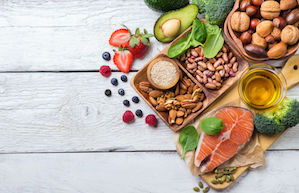There’s never been a wider range of foods available, yet it’s still possible to develop deficiencies if you go the fast-food route, are a picky eater, or exclude certain foods for ethical reasons, allergies or to lose weight. If you spot the following signs, changing the way you eat may be all you need to do. But, always check with your health provider first to rule out other possible underlying health issues.
"They can test for deficiencies, and may recommend supplements, though these can't replicate the complex variety of micronutrients and protective phytochemicals that work together in foods like vegetables and fruits", says Cape Town GP Dr Neville Wellington.
Hair loss
It’s normal to lose around 50 to 100 hairs a day, but if your shower drain or plug hole is clogged with hair, and you notice loose strands on your pillow, you may lack protein and iron. Protein is a vital building block of your body, and though deficiency is unusual in developed countries, you may not be getting as much as you need – particularly if you’re an athlete, are older, or are on a certain diet, such as a vegan one.
Have for a piece of red meat the size of your palm twice a week, chicken two or three times a week, fish the same, and one or two eggs – "maybe not every day, just to increase the vitamin pool", says Joburg dietitian Debby Watkins. Enjoy lentils, pulses and low-fat dairy for the rest. Other vegan iron sources include raw nuts and spinach.
Fatigue
Constantly feeling tired for no particular reason is a common sign of underlying illness, so always check it out. But, it may be a shortage of vitamin D, the sunshine vitamin. Staying indoors more due to work or lockdown and using sunblock (important to prevent skin cancer) can reduce your levels.
"Aim to spend about 10 minutes in sunlight several times a week without sunblock if you’re light-skinned, and five times longer if you’re dark-skinned", says Lila Bruk, a Johannesburg-based dietitian. You can also get vitamin D by eating more oily fish (such as sardines and salmon), meat (particularly beef liver), chicken, eggs, dairy, margarine, beans, broccoli and mushrooms, she says.
Mouth problems or sores
Developing cracks at the corners of your mouth (known as angular chelitis), or a swollen and glossy tongue (known as glossitis) or burning or numb mouth can signal a shortage of B vitamins such as B6 and B12, folate, riboflavin and thiamin.
Good sources of B vitamins include fish, meat, eggs, milk, fortified cereals, green vegetables (such as spinach and broccoli), beans, nuts, whole grains, bananas and low-fat dairy.
Dry skin
If your skin is dry and flaky, including your lips, you may be low in vitamin A, which plays a major role in skin health. To get more, eat green vegetables such as spinach and kale, orange ones such as carrots, squash and sweet potatoes, and orange fruits such as mangoes, paw paw, apricots and cantaloupe.
Bruises
Bruising more than usual? You could be low in vitamin C. The National Institutes of Health report that it’s needed for everything from immune function to the synthesis of collagen, which is important for strengthening capillary walls and preventing bruising. The recommended daily allowance of vitamin C is 75 mg for women, 90 for men.
Get good doses of vitamin C from red and green bell peppers, tomatoes, potatoes, citrus and other fruit (a medium orange has 70 mg), as well as green vegetables, says Watkins.
IMAGE CREDIT: 123rf.com

